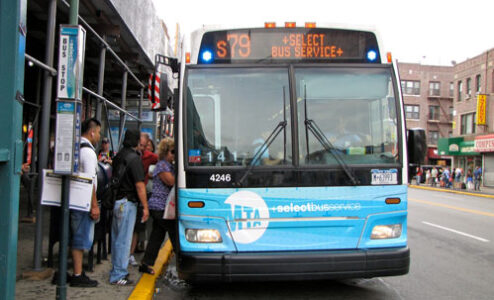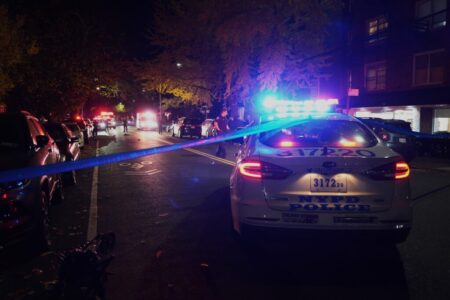The city’s transit system is in such dire shape, it will take all levels of government — federal, state and city — to get it back on track, according to a group of Southwest Brooklyn Democratic lawmakers who came to Bensonhurst Monday morning to demand action.
Led by U.S. Rep. Max Rose, the elected officials representing Southwest Brooklyn held a press conference near the entrance of the 20th Avenue D train station on 86th Street and said they will push for major investments in transportation to fix deteriorating subway and bus service.
“Our subways are melting down,” said Rose. “While Washington is playing games, the American people are losing.”
The blame for inaction could be laid at the feet of the Democratic House leadership, the Republican leadership of the Senate and at the feet of President Trump, according to Rose.
The nation needs a “comprehensive and holistic” plan to fix the country’s infrastructure and that plan should include major upgrades of the New York City transit system, as well as cyber security, the power grid and changes to enable the city to deal better with climate change, Rose said.
“I’m willing to work with anyone,” Rose said, adding that he will work to ensure that Southwest Brooklyn is not forgotten when it comes time for subway improvements.
There is a lot that needs to be done, Rose said. The subway system, in particular, is burdened with outdated track switches, trains that arrive late, or not at all, and other problems that result in hardships for riders, he said. “For too many of us, it takes more than an hour to get to and from work,” he said.
In addition to Rose, state Sen. Andrew Gounardes, Assemblymember William Colton and
Council Members Justin Brannan and Mark Treyger also spoke about the need to put a serious effort into repairing subways and buses to ease the burden on Southwest Brooklyn riders.
Gounardes, who noted that the recently passed congestion pricing plan is expected to generate $25 billion for the Metropolitan Transportation Authority, said, “The MTA is going to need $100 billion over the next 10 years.”
And once the MTA gets the funding, it will be up to elected officials and the public “to hold the MTA accountable,” Gounardes said.
At several points during the press conference, the lawmakers were drowned out by the noise of the D train pulling into the elevated train station above.
“Public transportation is not a luxury. It is a necessity,” Colton said. “All levels of government must participate” in coming up with a solution, he said.
When the MTA has problems with its switches, “it disproportionately affects the outer boroughs,” Treyger said, adding that a 90-minute commute is a routine occurrence for his constituents.
Brannan, whose constituents have similar commuting nightmares, said there are people who commute to New York City from out of state who have faster commutes than residents of the five boroughs.
“There are people in Connecticut, New Jersey and Westchester County who have a more reliable commute than the people that live in Coney Island, Bath Beach, Bay Ridge and Dyker Heights. This is not hyperbole; this is fact. The federal government has to step in, and having Congressman Rose on our side gives us hope we can get this done,” Brannan said
“You cannot be pro-economy if you are not pro-transportation,” Treyger said. “It’s one of the basic functions of government.”
Marnee Elias-Pavia, district manager of Community Board 11, said Bensonhurst has several infrastructure issues that need to be addressed, including transit services and clogged sewers.
The B1 bus line, which runs along 86th Street for a portion of its route, could use more traffic islands at the bus stops so that riders can wait for the bus in safety, she said. There are only two such islands on 86th Street, at Bay Parkway and 20th Avenue.

 MTA to boost S79 service after fare hike approval
MTA to boost S79 service after fare hike approval  Suspect charged with homicide for pedestrian’s death
Suspect charged with homicide for pedestrian’s death